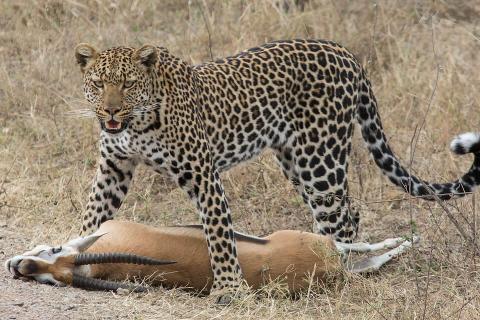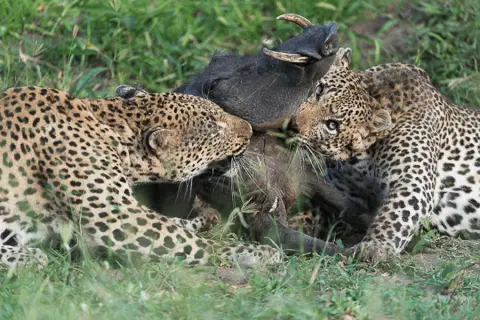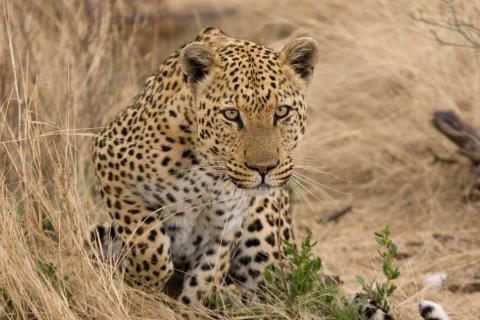African leopards, with their captivating beauty and unmatched hunting skills, roam the diverse landscapes of Africa. Understanding their dietary preferences unveils their survival strategies and the delicate balance of their ecosystems.
These elusive predators adapt to various habitats, showcasing their ability to thrive in different environments.
By exploring what leopards eat, we gain insights into their role as apex predators and their impact on prey populations. Their preferred prey includes a diverse range of animals, from majestic antelopes to nimble monkeys and elusive reptiles.
Delving into their hunting techniques reveals their remarkable stealth, agility, and lightning-fast strikes. Addressing questions about their interactions with humans and their reliance on water sources provides further understanding.
Join us as we uncover the dietary secrets of African leopards and appreciate their significance in the intricate tapestry of African wildlife.

What Do Leopards Eat?
Leopards are versatile predators with a diverse diet. They primarily prey on ungulates such as antelopes and gazelles. These large herbivores provide substantial nourishment.
Leopards also hunt smaller mammals like hares, rodents, and monkeys, showcasing their adaptability. During scarcity, they target birds and occasionally reptiles like lizards and snakes.
This opportunistic behaviour allows leopards to thrive in different habitats and maximize their chances of obtaining nourishment. Their ability to adjust their diet based on availability contributes to their success as predators in the African wildlife landscape.
What Animals Do African Leopards Like Eating?
Leopards have a diverse menu. Their preferred prey includes ungulates such as antelopes, warthogs, and similar animals. These larger herbivores provide substantial nourishment due to their size. However, leopards are adaptable and also feed on smaller mammals like hares, rodents, and monkeys.
Additionally, they occasionally indulge in avian meals by targeting birds perched in trees. They even have a taste for reptiles like lizards and snakes.

How Often Do Leopards Eat?
Leopards are opportunistic hunters and adjust their feeding frequency based on prey availability.
On average, they consume around 3 to 5 kilograms (6.6 to 11 pounds) of food per day. However, the actual frequency of their meals can vary depending on factors like successful hunts, prey size, and environmental conditions.
Leopards have the remarkable ability to survive for several days without food when necessary.
Do Leopards Eat Humans?
While extremely rare, there have been instances where leopards have attacked and consumed humans. It is important to note that such incidents are highly uncommon and should not cause unnecessary fear or panic. Leopards primarily prefer to prey on wild animals rather than humans.
Do Leopards Drink Water?
Leopards, like most other animals, require water for survival. They drink water from natural sources such as rivers, lakes, and pools when available. However, they can also derive moisture from their prey, especially during periods when water sources are scarce.
How Do Leopards Hunt?

Leopards are masters of stealth and have evolved remarkable hunting techniques.
They rely on their exceptional camouflage to blend seamlessly into their surroundings, making them nearly invisible to their prey. With patience and precision, they stalk their targets and get as close as possible before launching a lightning-fast ambush.
Leopards pounce on their prey, delivering a swift and powerful bite to the neck to ensure a quick kill.
What Eats Leopards?
Although leopards are apex predators, they are not exempt from threats. In some instances, they face competition and conflicts with other predators, such as lions and hyenas.
These larger carnivores can pose a danger to leopards, especially when it comes to defending territory or food resources.
Final Thoughts
African leopards have a varied and adaptable diet, enabling them to thrive in different habitats across Africa. Their prey choices range from ungulates to smaller mammals, birds, and reptiles.
Leopards are skilled hunters, utilizing stealth and patience to secure their meals. While they occasionally face conflicts with other predators, they play a vital role in maintaining the balance of the African ecosystem.
By understanding and appreciating their dietary habits, we gain a deeper appreciation for the intricate dynamics of nature and the importance of conserving these majestic creatures.
